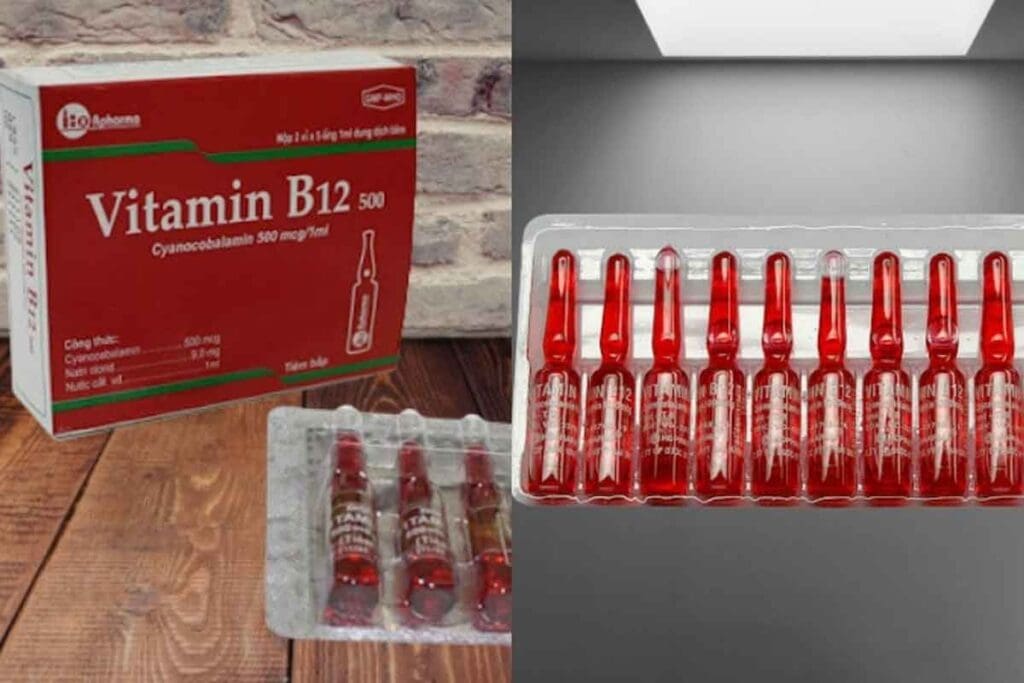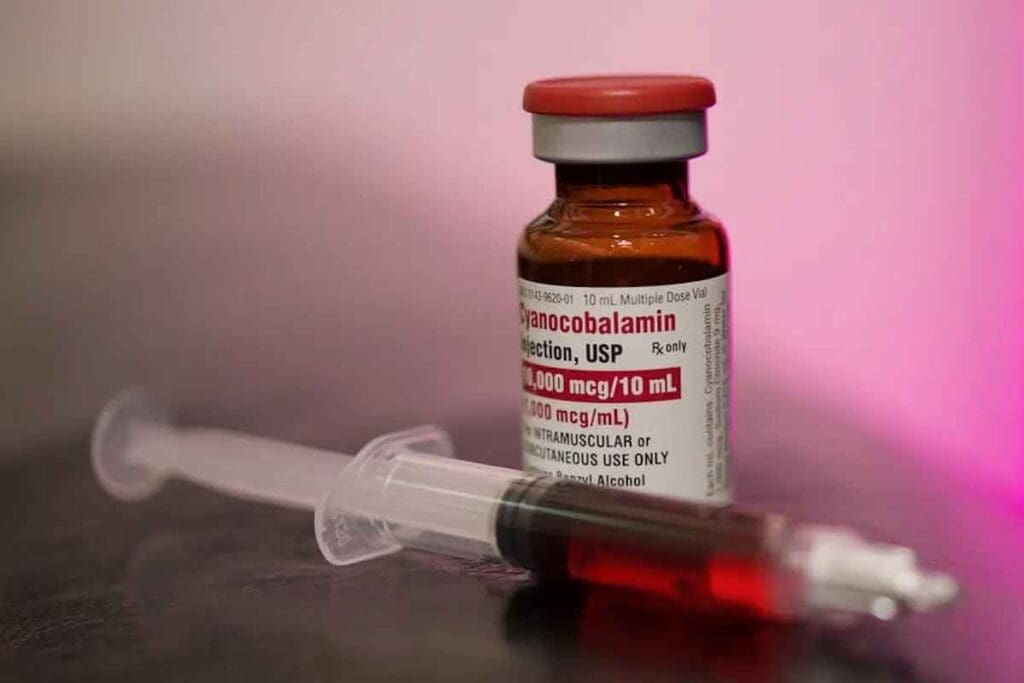Last Updated on November 17, 2025 by Ugurkan Demir

Vitamin B12 is key for our nervous system, making red blood cells and DNA. At Liv Hospital, we focus on the best care and proven vitamin B12 treatments. This guide will cover vitamin B12 monthly injection dose for adults, including IM, IV, and prescription advice.
Adults usually get vitamin B12 injections in doses of 1000 mcg, based on the deficiency level. We’ll talk about why vitamin B12 is vital and how to get it right through injections.

Vitamin B12 is key for our nervous system and making red blood cells. It helps with DNA production, fatty acid synthesis, and energy. This vitamin is vital for our body’s functions.
Vitamin B12 helps make red blood cells that carry oxygen. It also keeps our nervous system healthy by making myelin. Myelin protects nerve fibers. Plus, it aids in metabolizing fatty acids and amino acids for energy.
There are many reasons for vitamin B12 deficiency. These include diet, medical conditions, and some medicines. Here are some common causes:
It’s important to know the signs of vitamin B12 deficiency. This helps get medical help quickly. Common signs include:
| Symptom | Description |
| Fatigue and Weakness | Feeling tired and lacking energy |
| Megaloblastic Anemia | Producing large red blood cells |
| Neurological Changes | Numbness, tingling, and trouble walking |
If these symptoms don’t go away or get worse, see a doctor. Early treatment can help a lot and prevent serious problems.

Vitamin B12 injections come in different types, each with its own benefits and uses. The right type depends on the patient’s health, how severe their deficiency is, and the doctor’s advice.
Cyanocobalamin is a common Vitamin B12 in injections. It’s made synthetically and is known for being stable and affordable. It’s great for treating Vitamin B12 deficiency and is often the first choice for treatment.
Cyanocobalamin works well because it easily turns into the active Vitamin B12 in the body. This makes it a good option for many patients with different health issues.
Hydroxocobalamin is another Vitamin B12 used in injections. It lasts longer in the body, so patients need it less often. It’s best for those needing long-term Vitamin B12 treatment.
Doctors choose hydroxocobalamin based on the patient’s needs and how they react to treatment. It’s good for those who need Vitamin B12 to be released slowly over time.
Methylcobalamin is an active Vitamin B12 form used in some injections. It’s important for brain health and is chosen for patients with brain-related Vitamin B12 deficiency symptoms.
Other Vitamin B12 forms, like adenosylcobalamin, are used in certain situations. The choice depends on the patient’s specific needs and the doctor’s evaluation.
Every patient reacts differently to different Vitamin B12 types. So, doctors keep a close eye on how patients do and adjust treatments as needed.
Knowing the standard dosage for B12 injections in adults is key. The amount needed can change based on how severe the deficiency is. It also depends on how well the person responds to treatment and their overall health.
Adults with severe vitamin B12 deficiency often start with higher doses. A common dose is 1000 mcg daily, given either intramuscularly (IM) or subcutaneously. This high dose is used to quickly fill up the body’s stores.
Initial Treatment Phase: During this time, it’s important to keep an eye on vitamin B12 levels and symptoms. This helps doctors see if the treatment is working and if any changes are needed.
After the deficiency is fixed, maintenance therapy starts. The goal is to keep the deficiency from coming back. Adults usually get 100 mcg monthly, but this can change based on individual needs and the doctor’s advice.
Maintenance doses are given less often than initial doses. They might be given every 1-3 months, depending on how the patient is doing and their ongoing needs.
Adjusting the dosage is a big part of treating vitamin B12 deficiency. Doctors watch how patients are doing and if their vitamin B12 levels are getting back to normal. This helps decide if the dosage needs to be changed.
Factors Influencing Dosage Adjustments: Things like other health conditions, how well the body absorbs B12, and any side effects can affect the need for dosage changes.
| Treatment Phase | Dosage | Frequency |
| Initial Treatment | 1000 mcg | Daily |
| Maintenance | 100 mcg | Monthly |
It’s important to understand the standard dosages for B12 injections in adults. By adjusting the dosage based on individual needs, doctors can help patients with vitamin B12 deficiency get the best results.
Knowing the right amount of vitamin B12 injections in milliliters (mL) is key to good treatment. Doctors often talk about the dosage in mL, not just the vitamin B12 amount in micrograms (mcg).
Vitamin B12 injection vials usually have a standard amount. “Most commercial preparations contain 1000 mcg of vitamin B12 per mL,” making it easy to figure out the dosage volume. This standard helps avoid mistakes when giving the shots.
To give the right dose, you need to change the mcg amount to mL. For example, if a patient needs 2500 mcg and the vial has 1000 mcg/mL, you need 2.5 mL. This step is very important for the right dose.
Getting the dose right is key to avoid giving too little or too much vitamin B12. Doctors must be careful with their math to keep patients safe.
How often you get vitamin B12 shots can change, from weekly to monthly. For a weekly 1000 mcg dose, you need 1 mL if it’s 1000 mcg/mL. But a monthly 4000 mcg dose would be 4 mL, with the same concentration.
“The dosing volume for vitamin B12 injections can significantly differ based on whether the regimen is weekly or monthly, impacting the overall treatment plan.”
It’s important for both doctors and patients to know these differences. This helps make sure the treatment works well and is followed correctly.
For those with vitamin B12 deficiency, intramuscular injections are a good treatment. They put vitamin B12 directly into the muscle. This helps the body absorb and use it better.
The amount of vitamin B12 in IM injections varies. It depends on how bad the deficiency is and how well the person responds to treatment. At first, higher doses are used to quickly fill up vitamin B12 stores.
Initial Treatment: For severe cases, doses can be 1000 mcg to 2000 mcg. These are given once a day for the first week. Then, once a week for four more weeks.
Maintenance Therapy: Once the deficiency is fixed, smaller doses are needed. These are 1000 mcg, given once a month.
How often B12 injections are given changes over time. At first, they are given weekly. Later, they are given monthly.
The deltoid and gluteal muscles are often used for B12 injections. The choice depends on muscle mass and the doctor’s preference.
Injection Technique: Use a sterile needle and syringe. Clean the skin with an antiseptic before. Insert the needle at a 90-degree angle into the muscle. Slowly inject the vitamin B12 solution.
| Injection Site | Needle Length | Injection Volume |
| Deltoid | 1-1.5 inches | 1 mL |
| Gluteal | 1.5-2 inches | 1-2 mL |
IV B12 therapy is a key treatment in places where taking pills isn’t an option. It puts vitamin B12 straight into your blood, skipping the usual digestion steps. We’ll cover the main rules for IV B12 therapy, like how much to take and how to do it.
The amount of vitamin B12 for IV use depends on how bad the deficiency is and the patient’s health. Usually, doses are between 1,000 to 2,500 mcg per shot. For really bad cases, you might need more, and shots are given once a week, or as the doctor says.
For IV B12, the vitamin is mixed with saline and given slowly. It’s important to watch how fast it’s given to avoid problems. Our doctors make sure each treatment is safe and works well for you.
In urgent situations, like being in the hospital for a severe B12 deficiency or after some surgeries, IV B12 is very helpful. It quickly fixes the shortage, which is key to avoiding or handling serious issues.
The table below shows common IV B12 doses:
| Condition | Initial Dose | Maintenance Dose | Frequency |
| Severe Deficiency | 2,500 mcg | 1,000 mcg | Weekly |
| Mild Deficiency | 1,000 mcg | 1,000 mcg | Monthly |
| Malabsorption | 2,000 mcg | 1,500 mcg | Bi-Weekly |
Prescription vitamin B12 injections are key for those with a deficiency. They are given either in the muscle or through a vein. This choice depends on the patient’s health and the doctor’s advice.
Doctors look at several things when prescribing vitamin B12 shots. They consider the patient’s health history, how severe the deficiency is, and any conditions that might affect how well the body absorbs B12. They usually start with high doses and then lower them for maintenance.
We suggest talking to your doctor to figure out the right treatment plan. The amount and how often you get the shots can change based on your needs.
| Condition | Initial Dose | Maintenance Dose |
| Severe Deficiency | 1000 mcg IM daily for 1 week | 1000 mcg IM monthly |
| Mild Deficiency | 1000 mcg IM weekly for 4 weeks | 1000 mcg IM every 2-3 months |
For those needing regular shots, doing them at home can be easier. It’s important to do it right to stay safe and effective. We give detailed instructions and show patients how to do it themselves.
The steps for self-administration include:
How much insurance covers for vitamin B12 shots can differ. We tell patients to check with their insurance to see what’s covered. Many plans cover these shots if they’re medically needed.
We help patients find ways to make shots more affordable. We also guide them on how to deal with insurance claims.
Adults with special conditions need careful B12 injection dosing. Some health issues can change how much B12 is needed. It’s important to adjust treatment plans for these cases.
We will look at the right B12 doses for adults with certain health issues. This ensures safe and effective treatment.
Elderly patients might need different B12 doses. This is because they have less body strength and may have other health problems. Age can affect how well the body absorbs and uses vitamin B12.
People with kidney problems need to be careful with B12 doses. The kidneys help get rid of extra B12. If they don’t work well, B12 can build up and cause problems.
Those with malabsorption issues, like celiac disease or Crohn’s disease, might need more B12. Malabsorption can cause severe B12 deficiency. This means they need more aggressive treatment.
Healthcare providers can tailor B12 doses for adults with special conditions. This ensures they get the right treatment. It also helps avoid any bad side effects.
It’s important for healthcare providers and patients to know about Tiaminal B12 injections. These injections are made to meet specific needs in vitamin B12 supplementation.
Tiaminal B12 injections stand out because of their unique properties. They have:
The recommended dosage of Tiaminal B12 injections depends on the patient’s needs. Here’s a general guide:
Tiaminal B12 injections are used for treating vitamin B12 deficiency. They work well when oral supplements don’t help. But, there are some downsides:
Healthcare providers should check each patient’s needs and watch how they react to Tiaminal B12 injections. This helps make treatment better.
It’s important to know about the side effects and safety of Vitamin B12 injections. They are usually safe, but some people might have reactions.
Most people do fine with Vitamin B12 shots. But, some might feel:
These issues are usually mild and go away quickly without needing a doctor.
Even though rare, serious problems can happen with Vitamin B12 shots. These include:
Vitamin B12 shots can affect how some medicines work or have special warnings. For example:
| Medication/Class | Interaction/Effect |
| Chloramphenicol | May interfere with the hematologic response to Vitamin B12 |
| Colchicine | Can impair Vitamin B12 absorption |
| Aminoglycosides, colchicine, aminosalicylic acid | Can reduce Vitamin B12 absorption |
Tell your doctor about all your medicines and supplements before getting B12 shots.
Getting the most out of vitamin B12 therapy is key to good health. We’ve covered the important parts of vitamin B12 shots, like the right doses and how to get them. Knowing these details helps make a treatment plan that fits you best.
The dose of vitamin B12 shots depends on how bad the deficiency is and the type of B12 used. Shots can go into muscles or veins. Following the advice in this article helps doctors create a treatment plan that works for you.
It’s vital to talk to a doctor to figure out the best vitamin B12 treatment. This way, you get the most benefits and avoid any problems. Good vitamin B12 treatment not only fixes the deficiency but also boosts your overall health.
Learning about vitamin B12 therapy helps us support patients better. This detailed approach shows our dedication to top-notch healthcare. We aim to give personalized care and guidance to everyone.
Adults usually get 1000 to 2500 mcg of vitamin B12 in each injection. This is given either in the muscle or through a vein.
How often you get vitamin B12 shots depends on your health and how well you respond to treatment. At first, you might get shots several times a week. Later, you might only need one a month.
There are three main types of vitamin B12 for shots: cyanocobalamin, hydroxocobalamin, and methylcobalamin. Each has its own benefits and uses.
To figure out the dosage in mL, first know the concentration of the vial. Most vials have 1000 mcg/mL. Then, divide the dose you need by the concentration to get the volume.
The right dose of Tiaminal B12 shots varies based on your health and how you react to treatment. Always check the label or talk to a doctor for the best advice.
Yes, you can give yourself vitamin B12 shots at home if a doctor teaches you how. Just make sure to follow all safety steps and guidelines.
Most people don’t have serious side effects from vitamin B12 shots. But you might feel pain, redness, or swelling where you got the shot. Rare but serious problems can happen, and some medicines might not work right with B12 shots. Always talk to a doctor to stay safe.
Changing the dose for special conditions needs careful thought and a doctor’s advice. They will look at your situation and adjust the dose to make sure it’s safe and works well for you.
Whether insurance covers vitamin B12 shots depends on your plan and provider. It’s best to check with your insurance to see if you can get coverage.
IV vitamin B12 therapy is great for quick treatment in serious cases. It helps quickly fill up your vitamin B12 levels and can be very important in emergency situations.
Subscribe to our e-newsletter to stay informed about the latest innovations in the world of health and exclusive offers!